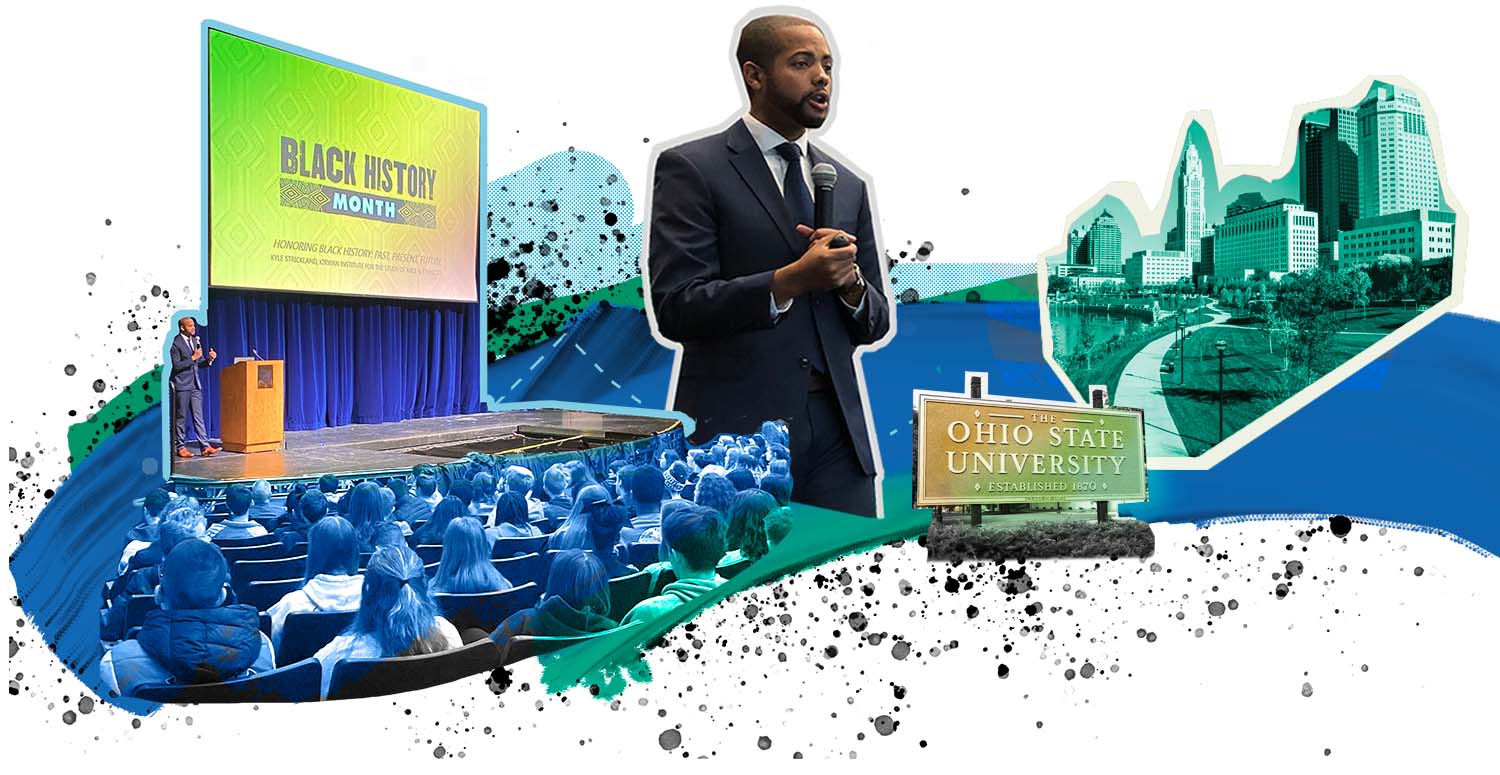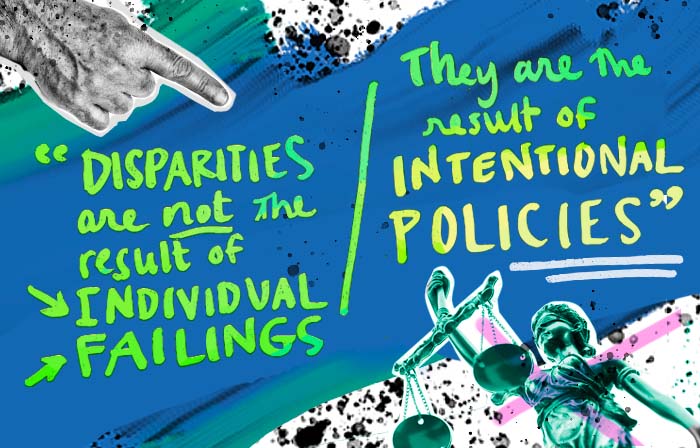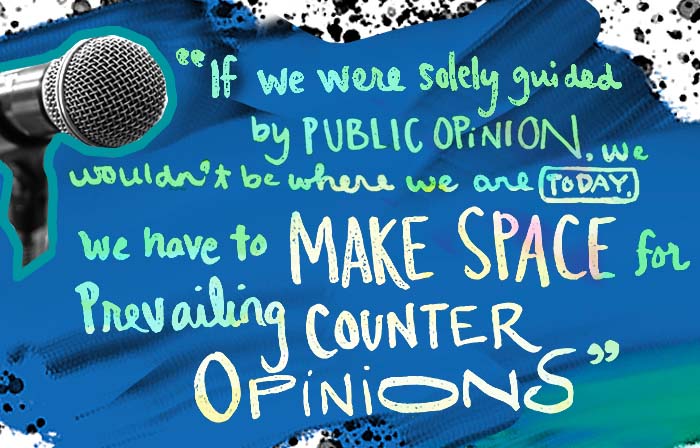
By Nicole Allred, Strategic Communications, Omidyar Network
What role does the economy play in the fight for racial justice and the defense of our democracy? Can we have a strong democracy without both racial and economic justice, or are they separate and distinct?
From the socially constructed idea of race to sociopolitical systems, our nation’s institutions have long excluded people from the promise of equal opportunity based on the color of their skin or economic standing. Today, thanks to the racial reckoning that continues to simmer beneath the surface, conversations acknowledging the presence and impact of systemic racism are finally near the forefront of American society. Acknowledging it is one thing. Overcoming it is another mission completely.
This is the work that Kyle Strickland is taking on as a deputy director of race and democracy at the Roosevelt Institute. A graduate of Harvard Law School, Kyle is working to unveil the systems behind disparities in our society often incorrectly blamed on individual failings.
As we continue our blog series focused on racial justice, we’re speaking with leaders in the field to highlight their perspectives and life journeys that led to their work. Through Kyle’s story, we discuss the myth of individualism, the power of narrative in defining community and culture, and how inequitable systems are threatening American democracy.
Nicole Allred conducted this interview with assistance from Hannah Brown. A transcript of our conversation is below, edited for length and clarity.
Listen to the audio version here:
Nicole Allred: I want to talk about the formative experiences in your life that led you to where you are today. Paint me a picture of what it was like growing up in Columbus and Ohio.
Kyle Strickland: I grew up in a predominately white suburb of Columbus — Worthington, Ohio — where I didn’t really feel like I fit in. Despite my family’s long historical roots in the area, I didn’t have a sense of belonging. When I learned more about my own family’s experience — my parents’ and grandparents’ experiences — then I understood how they were shaped by issues and events in our community.
NA: Is there a story or an experience from your early childhood that helped make you aware of your perceived place in the world?
KS: Often in school, I got in trouble because I was raising my hand or being disruptive in class. I thought that I was being treated differently, but no one listened to me. Now I look back on it, and it was so very clear that I was perceived as being disruptive because of my background.
The most significant event was when a student in sixth grade called me the N-word. We were playing basketball, and he got mad about something. That was one of the most visceral reactions and moments that I’ve had in my life. It was a deeply painful experience to me, and I will never forget it. Everybody who went to elementary school with me remembers that, including the kid who said it.
NA: You talk about the connection between race and democracy in the economy. That’s not very apparent to a lot of people. I’d love to hear more about how you went from these childhood experiences to forming those connections.
KS: I started to make these formations using my experiences growing up, and then later at Ohio State, which was more diverse than any school I previously attended. Ohio State is right in the heart of the city of Columbus, but five miles down the road is a completely different picture of that city. It’s predominately Black and communities of color. Many kids on the South or East sides of Columbus may never even step foot on campus. It was here where I started to make the connections between concentrated residential segregation, concentrated poverty, and how people blame individuals for their circumstances rather than systems and barriers.
Based on my own experiences, and those around me, I was always aware that so many outcomes in life depend on the opportunities that you may or may not get.
It’s not about some sort of individual or cultural flaw. That has always been deep at the heart of my work. Doing this work, we must be able to empathize with others and that sense of belonging.
NA: Talk to me about your grandfather and his journey obtaining a loan to have property. There’s disparity financially between different groups of people — race comes into it. How does he fit into these different issues that you’re starting to put names to and understand?
KS: My grandfather’s story is so illustrative of how all of this plays into where we are today. My grandfather graduated from high school, didn’t go to college, but he started his own business doing construction and later building homes. When he wanted to build his own home, he couldn’t get a loan. And it was very clear he was turned down, not because he didn’t have the right credit, but because of the color of his skin.
Eventually, my grandfather received financial support from the community and he paid them back. That history of my grandfather building a home — not only his actual craftsmanship, but also his experience of being discriminated against and unable to obtain a loan — helped me understand why so many others were unable to get a loan. Instead of being able to buy a home and build wealth, many Black families had to rent, preventing them from building wealth over time to pass down.

With redlining, I can look at my city and see how it’s divided between the East and West sides of the city so clearly. It’s not because people just chose to live somewhere, these were intentional policies that served as barriers to building wealth. So, you start to see these connections and realize this is part of a bigger picture and a bigger pattern. Disparities are not the result of individual failings. They are the result of intentional policies.
NA: I know you are aware of the systemic impact of one’s zip code and education on life outcomes. What would you say to a way of thinking that says, “If some people can make it today in today’s system, that this isn’t systemic”?
KS: The narratives we’ve been told about America are powerful. They’re deeply problematic narratives, but powerful nonetheless. This is why it’s so critical to do narrative work.
Bryan Stevenson says it best when he talks about how the North won the Civil War, but the South won the narrative war because so much of what we see today continues the rhetoric of the lost cause — the white supremacy rhetoric at the root of all these stories about reckoning with our country’s history. Sadly, even some people of color have internalized that narrative. That, too, is powerful, because what happens then is people perpetuating that narrative say, “Well, look, people of color also believe in it, so this must mean it’s not racist or problematic,” and that couldn’t be further from the truth.
When discussing the narratives defining issues of race and equity, if we were solely guided by public opinion, especially white public opinion, we would not be where we are today. We have to make space for prevailing counter opinions.

NA: That brings us beautifully into your current work at the Roosevelt Institute and the Race Landscape Project. Can you tell me what went into the formation of this project and how it came to be? And then if you can, share with us a little bit about what you’re finding so far.
KS: With the Race Landscape Project, we are making the connections between race, the economy and our democracy, which tend to be siloed. When people think about racial justice, they might think about a small segment of issue areas like voting rights or criminal justice, but they don’t really think about racial justice as connected to the economy — specifically how the economy has been structured in exclusionary ways as part of racist systems.
We must reckon with our history, not just acknowledge it, through actual material redress.
Ultimately, it’s going to come down to narrative change, policy change and the ways in which we, our courts and our institutions, make change happen. These are all parts of the connections made in our recent report. We’re excited about what’s to come.
NA: I have to ask, how has this pandemic — and the issue of The Great Resignation — played a role in all of this? How do you see the current moment in the pandemic and this labor movement impacting your work, and again, deepening that connection between race, the economy and democracy?
KS: It’s hard to believe that we’re now close to two years into the pandemic, and it has created a fundamental reckoning with where we and what we value as a society. What we’re starting to see are questions around deservingness.
We’re starting to realize how vulnerable we are as a society. But like anything when it comes to health and economic disparities, we also know that these disproportionately burden Black and Latinx individuals, indigenous communities and communities that continue to be marginalized by the policies in our society. So, when a crisis hits, our communities continue to be hardest hit and left behind.
I hope we don’t fall into this idea that we can just go back to normal, because normal was not normal for a lot of people. We normalized inequality. We normalized injustice. We don’t have to do that anymore.
We also cannot lose sight of the nearly 800,000 Americans and the millions around the world who have lost their lives because of this virus and the toll that it’s taken on families and communities. We can’t lose sight of that either, as we build moving forward.
NA: In our final minute, and because I like to leave things on a high note, I know obviously you’re working on intense, heavy topics. What brings you joy? What gives you hope as you do this work?
KS: I would say my three nieces who are 5, 3 and six months. When you get caught up in the work, it can be a lot. But to be able to spend time with them and to see them grow up, the light that they have in their eyes and the joy in their laughs brings me so much hope. Family means everything and is a source of strength to me. I hope that people have that same sense of hope, love, value and belonging as we try to create a better world.
Learn more about the Roosevelt Institute via their latest report, website, and Twitter.
